Fast Start Shoping List

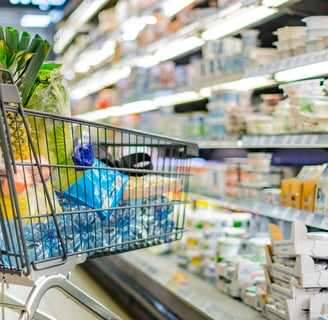
Fast Start Shopping List
Short on time? The following list provides you with a starting point for collecting/procuring and thinking through what you might need on your list. Customize it to your needs.
Take a Current Inventory:
Using the topics below, create an inventory of what you do, don't have. You'll be surprised at what you might have lying around. This is a good time to purge and toss out seriously aged items. However, if you are short on cash be more choosy about what you toss. An old something is better than nothing.
Typical replacement items:
Refresh batteries in flashlight. Segregate older batteries and use them up first in a crisis. Most batteries are rated for 10 years.
Drugs you rarely use but need to have around. Check expiry dates. Again, expiry dates are 'best used by' dates not a hard and fast rule.
Search the Unthinkable containers shoved in the back of the fridge or freezer; freezer burned items. Old cooking oil. Toss to make room.
Next, think thru activities you would do step by step. Do you have all the "ingredients"? Example, Johnny has a cut on his foot that needs stitches. Do you have bandages, disenfectant, antibiotics - what you need? How might you improvise? For example we put Toothbrush and paste on the list; do you use GUM soft pics or floss? There is where you need to fill in the gaps. If you only buy what is on the list you WILL not have things you need/want.
Despite best efforts there will be gaps. How many times have you pulled a recipe only to find you are out of a particular ingredient? Doing a step by step walk-through can prevent holes in your shopping list.
Cash / Currency / Money
Principle 1: Have Cash on Hand at home and some on you at all times
Cash is King in a natural disaster, banking crisis
(they typically throttle your spending/withdraws) and bank machines empty within hours.
During power outages, cash machines/visa other networks will be down.
If you want to buy food or gas, then you will need to do it with cash
CASH IS KING
Since most businesses do not hold a lot of cash, you are unlikely to 'get change' for the thing you buy. Your choice becomes "do without" or just pay the store with a bill / coins closest in value to the item(s).
Therefore it makes sense to hold a larger number of smaller bills for emergencies.
$100 works if you have $80 worth of groceries. We suggest you round up to avoid losing your change; or be happy you are able to get what you got and be on your way.
During a crisis, particularly if it drags on, you put yourself at risk of being robbed and/or having someone steal your bag of goodies when you leave the store. Be smart and be safe. Personal injury during a crisis over some crackers is simply not worth it.
Standard Case: your Bank or Credit Union goes bankrupt
Typically the FDIC will seize the bank over the weekend and transfer ownership and assets of the bank to another bank
You probably will not be able to access your accounts or cash machines during the 'down' period
The FDIC insures your cash up to $250,000 per account, but due to nuanced rules, you may be unable to recover amounts in excess of the FDIC limit.
Why? Because the Dodd-Frank bill allows for customer deposits to be 'bailed in'
If the FDIC is unable to reopen the bank, then your CASH becomes a lifeline
If .gov declares a "Bank Holiday" then the entire system has cracked up. This happened in the 1930s depression. Many banks never reopened and no FDIC insurance meant that most people lost everything.
Stash Your Cash - Considerations
Hide your cash in multiple places
Burglars ALWAYS look in the master bedroom 1st, and the Kitchen 2nd. Sofa cushions are not a great place.
DON'T PUT ALL YOUR CASH IN ONE LOCATION
FORFEIT LOCATIONS: Robberies. Keep some cash in a location so if you are threatened you have some cash to give up
FOR Safety DO NOT LET YOUR KIDS OR ANYONE ELSE KNOW WHERE YOUR STASH IS
How Much Cash - Considerations
You'll have to assess your needs. If you have a family of 4, and 10 days food in the house, you might want to hold enough cash to buy gas and groceries for a few weeks.
This depends on your circumstances
Assume in a crisis the prices could easily double
Be wary of law enforcement and do not disclose if you have substantial amounts of cash. Even tho this is not illegal, they can use civil asset forfeiture laws and confiscate your cash, especially if it is $5,000 or above.
We strongly recommend you understand your constitutional rights. The police cannot search you, your car or your house without a warrant, look into your pockets or trunk. State firmly you do not consent to any search. If you don't anything they find or see can be used against you. There are hundreds of videos on Youtube where officers abuse, beat, arrest and illegally search citizens. Take a look at this video: https://www.youtube.com/watch?v=rJd4Q4u5cqU (13 years old) and this horrifying deceptive shake down. https://www.youtube.com/watch?v=MkeS_0NQUZs
The amount of cash you hold will depend on your planning horizon and the number of people you are covering in your plan. Since we are community focused consider keeping a bit extra to help others in your community in a difficult situation.
Principle 2: Multiple Bank Accounts
DO NOT KEEP YOUR EGGS IN ONE BASKET
First, check the credit rating on your bank's debt (bonds). Credit ratings on banks that are poorly managed have low credit ratings. Close your account and go to another institution. You usually have to go to the institution to close the account. Any in-transit checks may bounce if you suddenly close the account so leave funds to cover outstanding checks.
If you have adequate funds to open multiple accounts, then look for institutions that have good cash machine access. This could include a Credit Union. NCUA is like the FDIC but you definitely want to check the details under "Here are the Limits of NCUA insurance" as the statements earlier in the article seem to be refuted here. Check with your credit union if you have questions. https://www.nerdwallet.com/article/banking/ncua-insurance-keeps-credit-union-deposits-safe
Multiple institutions increases the odds you can get cash from a cash machine.
If you have Brokerage accounts and a "cash" value in your account, check to see how it is being held. Brokerages have banks; they often have a 'sweep' feature where your cash is swept overnight into the bank where it becomes FDIC insured. FDIC limits apply.
Principle 3: Storing "Savings" / Counter Party
If you lend money to a bank (aka a 'deposit') the bank is the counter party. The counter-party must perform for you to get your cash back from the bank.
If you hold cash in a short-term T-Bill via the US government's "Treasury Direct" account, then the US government is the counter-party.
The US government is the counter-party for the FDIC insurance fund if it runs out of money.
Congress has to approve a bill to bail out the FDIC. In a large-scale banking crisis, congress does not have to bail out the bank.
You may be safer holding T-BILLS for funds you don't need active access to thru Treasury Direct. Typically a better interest rate than a bank and you can buy 4, 8, 13, 17 .. week duration bills up to 2 years. Longer than 2 years is a T-Bond. We recommend shorter duration bills if you think you will need access. For practical purposes assume you won't use the money or cash out the t-bill before it matures.
NOTE: You link a bank account to the treasury and buy bills from your bank account; when matured, your $ is sent back to your bank account.
If .gov is bankrupt and/or defaults on payment of interest or principle (generally the last thing they will consider unless the crisis is global and a wipe-out) then all bets are off.
In that case: CASH OUTSIDE THE SYSTEM IS KING. There is no counter-party.
Keep gas tanks full
Change your habits to top off your tank regularly and avoid letting your tank get less than 1/2 full. A sudden or prolonged power outage will mess with your ability to get fuel and could come on suddenly. Easy to do, helps you last longer and have more options in a crisis. Especially important if you are in a rural area with a longer drive to services. We are presenting refilling when down 1/4 tank due to amplified risk.
If you store gas, always use a gasoline stabilizer to the fuel.
Ethanol Sheild
ES removes water from your containers/gas tank.
Water forms when gas evaporates.
Your gas will last much longer
Our research indicates this product actually works
Funnels. Get a funnel or 2. Very difficult to transfer gas safely without them.
5-gallon containers of gas are heavy, 40+ lbs.
Size your containers so you can lift them and pour from them.
Size of can will depend on your strength, storage needs, and location.
Rotate fuel in the gas can into your car every 6-or so months. Use fuel stabilizer in your stored gas,
Precautions - Storing Fuel - Learn about properly storing fuel. Here's some tips:
If you have natural gas appliances in your garage (water heater, furnace) you don't want to store gasoline in the same location as the appliance may have a pilot light or open flame which could ignite gasoline fumes.
Don't store inside your house.
A large plastic storage bin that you can lock might be a good alternative, or an outdoor shed, etc. Generally you do not want the location to be in direct sun (cooler is better). ALWAYS use an approved gas can.
Do your own due diligence!! This is not a safety course on gasoline storage.
Emergency Supplies in your Car
In a natural disaster you may need to stay in or get stuck in your car. A small backpack with water, emergency mylar reflective blanket, a flashlight with fresh batteries and extra batteries, snacks can help. Especially important if you have kids or elderly with you. Rotating the goods is important as car temperatures will damage your supplies. See Warm and Dry below.
Water: Home Depot has the least expensive 4oz Emergency Water pouches with a 5-year shelf life. Easy to tuck around your spare tire or have in the trunk, back of seat or door cubbies. https://www.homedepot.com/p/Mayday-4-225-oz-125-ml-Emergency-Drinking-Water-100-Pack-73011/302014530#overlay
Food and Water
Water
Water Uses
Drinking Water - you will consume and/or use for cooking. Estimate 1.5g per day per person. Add if you have pets.
Toilet flushing water - this can be lower quality. 1.5g per flush on newer toilets. For as long as your municipal sewer system is working.
Wash up (personal) and dish-washing water.
If you are on a water budget, use paper plates and/or wipe off as much food as you can before you wash the item
Water Containers / Life Straw
BPA Free plastic containers for long term storage of drinking water.
Options: Water Brick (don't forget the spigot),
BPA free buckets with screw on lids used for food storage
Any container will do if you aren't drinking the water. These are lower cost. (Like a Home Depot bucket with a lid)
PETE2 (Milk Jugs) - these are cheap and when clean usable for short term drinking water. They DO NOT STORE WELL and may leak if you put them on concrete. PETE chemicals leech into the water and ruin the taste after 4-5 months.
Get creative! An old bucket with a clean plastic liner can be useful.
PLANB water. Eventually you will run out of water and need to recharge your containers. Gravity filters, widely available are available, BUT there seems to be a problem with manufacturers overstating the capabilities of the filters and/or deceptive practices and statements. Berkey apparently has a class action lawsuit over false claims. Alexapure Pro Water System is a typical design. That said, we think that 'pre' or post treating the water you put thru this system is a good idea if you are pouring untreated water into the filter. Clearing sediment (pillowcase, etc) and letting the water sit with water purification tabs) and/or pre-chlorination (which would then be filtered out by the unit) would improve the water condition and increase your confidence in the final product.
Surface Water
If available, you may be able to filter the water for drinking.
AVOID DISASTER: Do not drink dodgy water. Pathogens can kill.
You can filter sediments with a pillow case or sheet.
Bandanas are useful for a huge range of things in a pinch. Cheap buy on Amazon.
You can treat the water with water treatment tabs or small amounts of unscented non-gelled regular bleach.
If you have a decent source of heat, you can boil the water for a few minutes to kill most pathgens.
Emergency: If you are in an area that has creeks, rivers then a Life Straw (above) or equivalent can be used to drink water directly from surface water. FOLLOW THE INSTRUCTIONS. The filters can clog with too much sediment so try to clear sediment if possible; placing in a container sediment may settle to the bottom.
Saving Water / Short Term
In a severe situation, your hot water tank will typically have 40-50g of water (no storage with a Flash hot water heater). You will need a hose to empty the tank.
Place a heavy (4 Mil) clear plastic tarp in your bathtub, and fill the tub at the beginning of a disaster in order to sequester public water for use. Cover the water with a cardboard box to prevent dust. 25 to 35 gallons or more are possible via this method. Or see Alexapure Emergency Water Bank: https://alexapure.com/collections/frontpage/products/alexapure-emergency-water-bank
Put a trash bag liner in a 5-g bucket and fill 7/8 full. The liner keeps the water from contacting the walls of the bucket.
Food
Foods are segregated into 3 groups based on the energy required before you consume them. Items in Group 1 require zero to small amounts of energy. In a disaster you will likely need an alternate method of cooking like a camp stove. See Stoves, Heaters and Fuel
Required Tools: Can Opener, Knife, Fork, Stir Spoon. May require a small pan to boil water, heat item for taste, etc.
GROUP 1
Canned Corn, Soups, Beans, Chili, SPAMm canned ham, canned corn beef, etc.
Tea, Instant coffee
Dehydrated Food (requires clean water but no cooking; but may not taste good if cold).
Buy things you routinely eat and/or are willing to consume, then rotate the foods to get the best quality / usage
Canned foods can be eaten past the expiration date, but the quality may deteriorate and/or be impacted by the metal or plastics used to line the can.
Food packed / canned in jars (jam, canned fruit)
Nuts (nuts oxidize quickly - no good way to prevent this without damaging the taste. 12-month-18 month shelf life.
Foods with fats that are exposed to oxygen will go rancid. Be careful to watch expiry on oils.
Cereals
Dehydrated canned milk (aka Powdered milk) that is non-fat has the longest shelf life.
GROUP 2 - Foods that Require Moderate Cooking or Reheating
Meats, Hot dogs, sausage, eggs
Pasta, White Rice
Grains (note that brown rice does not store well for extended periods)
Potato, Potato flakes
Some veggies (raw)
Home-made Stews, Soups
GROUP 3 - Foods that Require longer preparation (ingredients) and cooking
Dried beans -
Pre-Soak 6-8 hours, toss water. Refill pot with water and boil. May have long cook time. If you haven't done this, practice ahead of time. Look up recipes in advance. Soaking degasses beans and can be stinky - leave outside overnight with lid if possible.
A pressure-cooker (non-electric) can greatly reduce cook time and energy consumption
If you are not used to cooking beans, you need to rinse and check for pebbles/sand as these may be present in packaging
Flour
Wheat, Oat, Barley, Buckwheat, Amaranth, etc.
YEAST, SALT, BAKING POWDER, BAKING SODA should be on your list!
If you are allergic to gluten then you will need to stock up on appropriate grains
Grains - If you have whole grains, MAKE SURE YOU HAVE A GRINDER/MILL TO PROCESS THE GRAIN!
Baking - Use a Dutch Oven, or you can "bake" bread in a skillet
If you have never done this before, practice in advance!
GROUP 4 - Perishable Items in your Fridge/Freezer
In a Grid Down scenario, a newer fridge/freezer will typically hold food 20-24 hours before the items are damaged by thaw or increased temps.
In a disaster scenario, there is probably a reasonably large amount of food and dollars invested, so if you don't want to lose it you must find some method for operating the appliance when the power is out.
Alternatively you can cook food ahead and buy yourself some time.
If it is cold outside, then you might place food outdoors in a cooler.
Consider freezing a couple of milk jugs in the freezer and moving them to the fridge when the power fails. This will extend your cool period. This works well if you are in an area with unreliable or intermittent grid power.
Use a cooler and ice (about 2 day of refrigeration).
Use a GENERATOR or "Solar" Generator (a battery) to run the appliance.
Prescriptions, Generic Meds, Caffeine, Medical Devices
Get a 90-day supply of any required prescriptions. Doctors can order. If insurance doesn't cover it, consider paying out of pocket if you cannot go without the meds. Meds may be very difficult to obtain in a crisis.
Coffee is a great comfort food and for those who, uh, "might" be addicted to caffeine will want to insure a supply. Think thru the logistics of grinding coffee if you typically store beans. See Long Term Food on how you can use Mylar bags to store coffee. NOTE: freshly roasted coffee degasses CO2 for 24-48 hours, so we recommend you not pack in mylar until the coffee has a chance to rest after roasting. Lighter roasts take longer to degass. Pack with O2 depletion pouches and store in a cool dry location. Smaller mylar bags (quart or less) may be more suitable for 1 or 2 individuals, and helps keep the coffee fresh longer if not stored in a large bag.
Medical devices that require power (CPAP?) -
Stay Warm and Dry
An imperative in cold and wet climates and your are stuck outside. Hypothermia is a killer.
Must Haves
Polyester base-layer for everyone (long underwear). Do not use cotton , cotton mix fabric or rayon as it will remove heat from your body.
Hat: Your head causes significant heat loss. Wool, Felt, Poly (no cotton)
Good quality footware (boots if you are out and about) that is insulated and supports your ankle. Especially important to prevent strains/sprains in uneven terrain.
Gloves/Mittens (thinsulate). Mittens keep your fingers warmer. If you have gloves and want to use a touch-screen, fine gloves with touch-sensitive finger pads.
Emergency thermal blanket (polyester or wool). Mylar Emergency blankets reflect heat back and can be used in conjunction with a thermal blanket.
If you sleep on the ground, an insulating pad
Tarp (Min 8x10 with grommets) parachute cable (strong, reliable) and / or a tent (depending on circumstances)
If you have a tent, always use with a tent fly; thick tarp under the tent floor to prevent puncture; and 'tarp' the tent per boy scouts! REI has primo, but not inexpensive, tents. Look for rubber coated nylon.
BUG OUT: Water resistant/proof backpack. This is essential if you decide you must "bug out" and leave your primary location.
NOTE: We do not specifically cover 'bugging out' - but should you decide this may be a requirement (particularly in a dense urban environment) this creates an entirely new level of risk and planning.
Effectively you will be a 'refugee' and what you can carry/pull/cart along will be what you have if on foot
Physical maps (coated paper) will be critical in GPS or cell sites are down and you should have those for your local area and state.
RECOMMENDATION: From reading up on this topic you need to make a decision to stay or go within the first 12 to 24 hours. After that traffic may prevent an exit.
Plan! Know where you are going. "Not here" is not a destination
Personal safety/risk increases in bug-out situations.. The unprepared might look at you as a supply source. Plan on how to deal with this.
Lighting: Flashlights, batteries and Emergency Public Bank Radios
Good quality flashlights and batteries are essential if you are grid down
Batteries: Costco #1 place for low cost good quality high quantity per pack batteries
We do not recommend open flame candles or gas-fired lamps indoors, or in arid outdoor locations. The lone exception we have found are the UCO Candlelier Lanterns (1 and 3 candle) on Amazon: 3 candles can provide a suprisingly large amount of heat which might be helpful in the cold. 9hr candles. Link: https://www.amazon.com/gp/product/B000F6NNP8/ref=ewc_pr_img_3?smid=A16URWJ9NS8K46&th=1
Kerosene lamps can be useful with low-odor/smoke parafin oil. There are 2 types of Kerosene. ONLY USE K-1 kerosine for indoor heaters or lamps. K-2 has higher sulfur and the smoke is toxic.
Always supervise kids when open flame is around. Keep a small fire extinguisher handy.
Avoid high-lumen flashlights as these can injure eyes and burn through batteries quickly. Kids are notorious for shining flashlights into sensitive eyes!
In case you have a generator, Never run a gas or propane generator indoors or in a garage!
Emergency Communications
As mentioned, cell towers will go down quickly in a disaster / power outage
Have a designated person outside the area where you can leave messages/texts in case you cannot connect locally.
Walkie Talkies. For most people look for GRMS (General Mobile Radio Service) walkie talkies and get something that has decent range AND a large battery. Not a perfect solution. If there is a GMRS repeater, your signal can travel further. A bit of a learning curve is required. You need a license from the FCC. They are easy to get - takes a couple of weeks from filing. A license covers all members of a household. Buildings/Trees interfere with signal, and shortens the distance the radio can transmit. Open areas good; cities with tall buildings not as good.
Manufacturers: TDRADIO, BaoFeng Tech. Available on Amazon. Keep it simple so users don't struggle with operation...
Hygene, Minimal First Aid Kit
Tooth brush
Tooth paste
Deodorant
Small travel dish soap (can be used for hand and dish washing).
Toilet Paper and or wet wipes. Paper Towels or hand towels.
FIRST AID KIT MINIMUM: Scissors, tweezers, neosporin, bandaids, tylenol, advil, Immodium (the runs can quickly dehydrate you), anti-acid.
Refresh your first aid kit if you have had it for more than 3 years.
Drugs get old; Band-aid & tape doesn't stick, etc.).
Aspirin (81mg) can be used to treat heart attacks (anti-clotting).
Hydrogen peroxide/alcohol wipes; wound closure butterfly type bandages.
Gloves (latex, non-latex)
Gauze
Cold or hot packs
Emergency blanket (mylar)
Face masks.
A first aid booklet
Nuclear event. Downwind fallout is exceptionally dangerous. Iodine pills will purge radioactive iodine that will be taken up by your thyroid.
For kids: Apple Pectin will help the body purge radioactive elements.
Strongly recommend you do a bit of research. We have both in our emergency kits.
Bug Protection
An astonishingly high number of people die (.5 to over 1m) each hear from insect-borne illnesses. Untreated Lyme's disease can severely damage your body especially if you do not treat it quickly.
Bugs hate permethrin. You can buy this in 10% concentration. Mix it 1 part permetherin and 10 parts water then soak your clothes in them (do this outside!) with a sprayer and let them air dry. Use latex/nitrile or other gloves during this procedure. Note that washing and especially the dryer will remove / reduce the effectiveness of permethrin. Do not directly apply to your skin without thoroughly checking health risks.
Tuck in pants inside your socks/boots and your shirt inside your pants to prevent ticks from climbing up your clothing. Some ticks will drop on you from trees above or bushes, so a hat is important to keep them out of your hair.
Misquito bricks in a bucket of water subverts misquito lifecycle and can help reduce the numbers. Always empty standing water / tires to prevent breeding. Dried eggs can dry out and rehydrate and grow bugs.
Cash is King
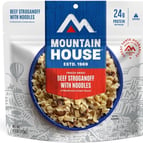

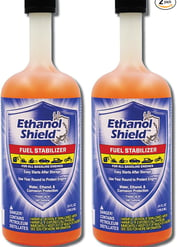


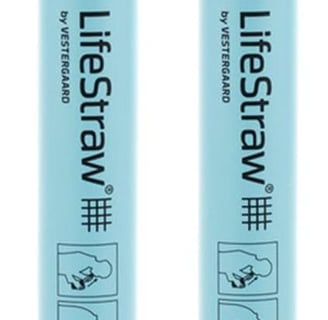
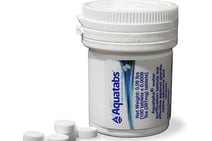

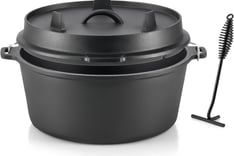

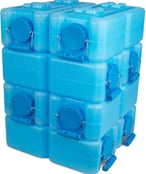

See Backup Power
See Backup Power
Gas Cans: Gas should be stored in an appropriate location and container.

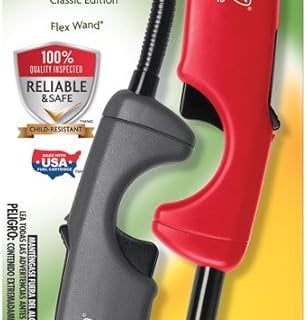
BIC Multi-Purpose Lighter and Flex Wand Lighter, or generic Long Lighters
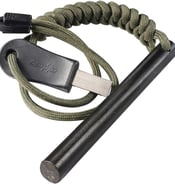

Ferrocerium Flint Fire Starter or similar (Amazon)- see Video
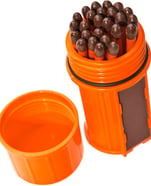

UCO Stormproof Match Kit w/water proof case (Amazon)
